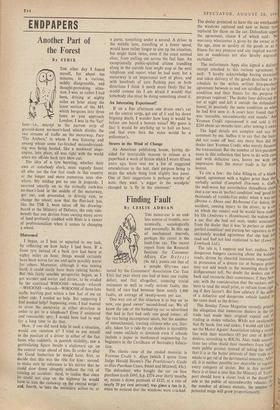Finding Fault
By LESLIE ADRIAN One way out of this situation is to buy an 'as new, one good owner' second-hand car. We all know the tale of the bashed-up car so advertised that had in fact had only one good owner, all the rest being incompetent idiots, but the number of unmechanical, trusting citizens who are, liter- ally, taken for a ride by car dealers is incredible and seems unlikely to diminish even if schools include a paper in mechanical engineering for beginners in the Certificate of Secondary Educa- tion.
The classic case of the misled motorist is Yeoman Credit v. Apps (which I quote from Judge Harold Brown's The Practitioner's Guide to Hire Purchase Cases, Sweet and Maxwell, 45s.). The defendant, who bought the car on hire purchase (cash £495, h.p. £574 over thirty months or minus a down payment of £125, at a rate of nearly 20 per cent interest), was given a run in it, when he noticed that the windows were cracked. The dealer promised to have the car overhauled, the windows replaced and new or better tyres replaced for those on the car. Defendant signed the agreement, clause 8 of which said: 'N° warranty whatsoever is given by the owner as 1° the age, state or quality of the goods or as to fitness for any purpose and any implied .warran' ties or conditions are also hereby expresslY excluded.'
The unfortunate Apps also signed a delivery receipt attached to - this curious agreement. 11 said: `I hereby acknowledge having examined and taken delivery of the goods described in the schedule to the within written hire-purchase agreement between us and am satisfied as to their condition and their fitness for the purpose 01 purposes required.' The dealer later delivered the car at night and left it outside the defendant's house, in precisely the same condition as when he had first seen it. A court later found that it was 'unusable, unroadworthy and unsafe.' And Yeoman Credit repossessed it and sold it for £210 about six months later, after towing it awaY.
The legal details are complex and not for comment by me. Suffice it to say that the buyer did not come off best, any more than did the dealer (not Yeoman Credit, who merely financed the transaction). But the number of hire-purchase cases in this collection that have to do with cars, and with defective cars, leaves me with the impression that the motor, trade is far from honest.
To cite a few: the false filling-in of a blank, signed, agreement with a higher price than that verbally settled (Campbell Discount v. Gain; the well-worn but nevertheless threadbare claim that a car was in 'perfect condition' and 'good for thousands of trouble-free miles' when it was not (Brown v. Sheen and Richmond Car Sales); the accident, causing injury .to the driver, to a car on which the vendor said hd would have staked his life (Andrews v. Hopkinson); the widow-sold a car that she had not seen, under assurances from the dealer that it was 'in perfect or almost perfect condition' and putting her signature to an intricately worded agreement that she had not read and had not had explained to her (Lowe V. Lombank Ltd.). The tale is, I suppose and fear, endless. The dangerous bangers careering about the holidaY roads, driven by cheerful innocents temporarily in possession of a dream car at bargain prices, may not add much to the mounting death and disfigurement toll. No doubt the dealers can sll back and reconcile their consciences, if they have any, with the consideration that the suckers onlY have to read the small print, or refrain from sign' ing if they haven't. But how salutary if the seller of a defective and dangerous vehicle landed in the same dock as the driver.
The Sunday Times Magazine recently printed the allegation that numerous dealers in the car trade had made their original capital out of trading in stolen vehicles. While not swallowing that fly hook, line and sinker, I would still like 10 see the Motor Agents' Association taking a strong line with their members (85 per cent of British dealers, according to RICA). Alas, trade associrt" tions too often shield their members from legit" mate public protest, instead of taking the stand that it is in the better interests of their trade as 3 whole to get rid of the detrimental minority. After all, it is neither possible nor desirable to register every category of dealer. But in this instance there is at least a case that the Ministry of Trans port should have a closer look at the deceptive sale to the public of unroadworthy vehicles. A5, the number of drivers mounts, the number' °f potential mugs will grow proportionately.






























 Previous page
Previous page